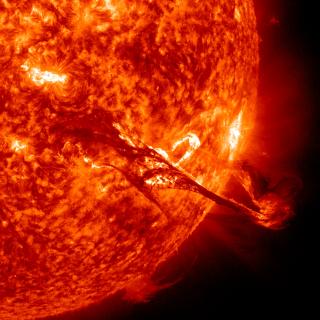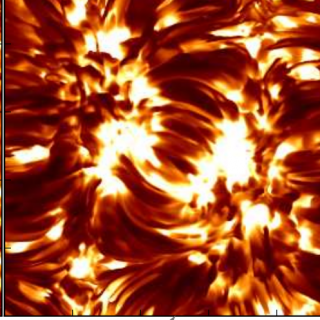Bibcode
Díaz Baso, C. J.; Martínez González, M. J.; Asensio Ramos, A.
Bibliographical reference
Astronomy and Astrophysics, Volume 625, id. A129, 8 pp.
Advertised on:
5
2019
Journal
Citations
16
Refereed citations
13
Description
Aims: Our aim is to demonstrate the limitations of using a
single-component model to study the magnetic field of an active region
filament. To do this, we analyzed the polarimetric signals of the He I
10830 Å multiplet, which were acquired with the infrared
spectrograph GRIS of the GREGOR telescope (Tenerife, Spain).
Methods: After a first analysis of the general properties of the
filament using HAZEL under the assumption of a single-component model
atmosphere, in this second part we focus our attention on the observed
Stokes profiles and the signatures that cannot be explained with this
model. Results: We have found an optically thick filament whose
blue and red components have the same sign in the linear polarization as
an indication of radiative transfer effects. Moreover, the circular
polarization signals inside the filament show strong magnetic field
gradients. We also show that even a filament with such high absorption
still shows signatures of the circular polarization that is generated by
the magnetic field below the filament. The reason is that the absorption
of the spectral line decays very quickly toward the wings, just where
the circular polarization has a larger amplitude. In order to separate
the two contributions, we explore the possibility of a two-component
model, but the inference becomes impossible to overcome because very
many solutions are compatible with the observations.
Related projects

Solar and Stellar Magnetism
Magnetic fields are at the base of star formation and stellar structure and evolution. When stars are born, magnetic fields brake the rotation during the collapse of the mollecular cloud. In the end of the life of a star, magnetic fields can play a key role in the form of the strong winds that lead to the last stages of stellar evolution. During
Tobías
Felipe García

Magnetism, Polarization and Radiative Transfer in Astrophysics
Magnetic fields pervade all astrophysical plasmas and govern most of the variability in the Universe at intermediate time scales. They are present in stars across the whole Hertzsprung-Russell diagram, in galaxies, and even perhaps in the intergalactic medium. Polarized light provides the most reliable source of information at our disposal for the
Ernest
Alsina Ballester